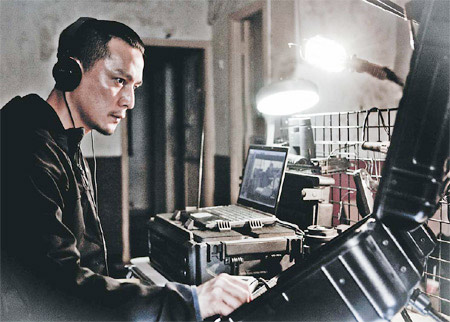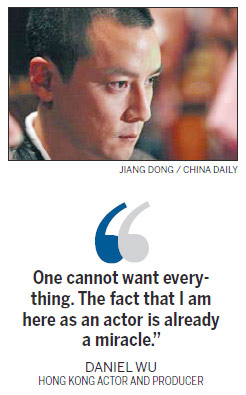Movies
The making of a kungfu star
Updated: 2011-08-18 09:16
By Liu Wei (China Daily)
 |
|
Hong Kong actor Daniel Wu stars in the crime thriller Overheard 2. Provided to China Daily |
He may be one of China's most enduring sex symbols, but actor Daniel Wu, 37, has also played complex roles that have put the spotlight on his acting talents rather than on his good looks and squeaky clean image. Such as the hooligan in New Police Story who kills cops because his policeman father does not care for him, or the dual role of two brothers with opposite personalities in Night Corridor. In his latest work Overheard 2, a crime thriller to be released on Aug 18, he plays an avenger who places bombs on downtown streets and manipulates the stock market.
The University of Oregon architecture major's next role, however, is even more demanding.
The actor-turned-producer set up a studio, Diversion Pictures, with actor Stephen Fung, earlier this year, with the ambitious goal of creating the next Chinese kungfu star.
"Kungfu films are an integral and important part of Chinese cinema," he says, "but Jet Li seldom fights now, and Jackie Chan is 57. We have Donnie Yen, but he cannot be in all the kungfu films. We need new blood."
Wu worries that in future Chinese kungfu films will end up having close-up shots of stars who know nothing about martial arts and fight sequences that are dubbed.
"How will our films be any different from the Hollywood ones then?" he says.
Fortunately, he and Fung have found a 22-year-old, who has never been on the big screen before, to lead Tai Chi, Diversion's first project.
According to Wu, the young man has won many kungfu contests and is an amazing actor. "I cannot promise he will be the next Jet Li or Jackie Chan, but at least we are doing something. If we do not try, nothing will change."
Huayi Brothers, which is partnering Diversion, will not release the name of the actor yet.

The low-key actor's fascination with kungfu goes back to his childhood. Born in the United States to Chinese parents, Wu had few opportunities to see Asian idols on screen until his grandfather took him to see Jet Li's Shaolin Temple when he was 7.
He was hooked and began learning martial arts at 11, eventually founding the University of Oregon's wushu club in 1994 and serving as the team's first coach.
Although his filmography has no kungfu film, he has never stopped practicing martial arts.
"It is in my blood," he says.
He even joins the professionals when he has the time, practicing with them for months. It was while training with a Shanghai team in 2005 that he broke the ligament in his right knee. "The coach asked me why I worked so hard, because people as tall as me (1.86 meters) tend to get hurt doing wushu," he recalls. "It happened on the last day I was with them. I heard my ligament snap like a cabbage stalk. I realized then that every person has his or her limits."
He says he has no regrets about not playing the lead in a kungfu film, noting he has gained much from the industry.
"One cannot want everything," he says. "The fact that I am here as an actor is already a miracle."
He says he never thought of becoming an actor when he landed in Hong Kong in 1997 after backpacking around Asia for two years. He had spent all his money, $2,000, on the trip and his sister, who worked in Hong Kong as a model, suggested that he take up modeling as a part-time job.
Director Yonfan approached him for his gay love story Bishonen (Japanese for "beautiful youth"), after seeing one of his photos. At first Wu turned him down, confident of neither his acting nor his Cantonese.
But Yonfan would not let go. He kept calling him and told him he could definitely do it, so he took the role, and soon, others followed.
"I have been very lucky and have gained so much from the industry. It's time to reward it," he says.
He intends to spend more time and energy on his studio, and an agency he has been running for several years to help talented artists. Although he will continue acting, he says he will be more choosy about the projects he takes on.
The studio aims to produce 10 to 15 films in five years, targeting young audiences, in the 15-25 age group.
His agency has six artists and artist groups, including a hip-hop band, an actor, a rocker and a visual effects specialist. What they share in common is that their works are often deemed non-mainstream in Hong Kong.
"I want to see a more diversified art scene in Hong Kong," Wu says. "That's why I love Beijing more, because here you see a variety of everything, such as indie bands and the 798 art zone."
Although producing a film or promoting an artist is more challenging than acting, Wu looks forward to it.
"Actors just wait for roles, and have to face the paparazzi," he says. "Now I can choose things I think are right and fun."

Specials

Biden Visits China
US Vice-President Joe Biden visits China August 17-22.

Star journalist leaves legacy
Li Xing, China Daily's assistant editor-in-chief and veteran columnist, died of a cerebral hemorrhage on Aug 7 in Washington DC, US.

Robots seen as employer-friendly
Robots are not new to industrial manufacturing. They have been in use since the 1960s.